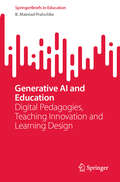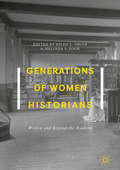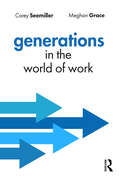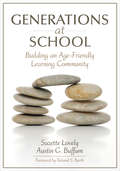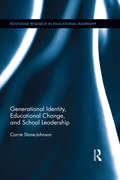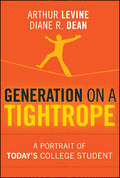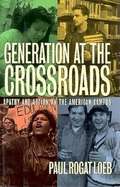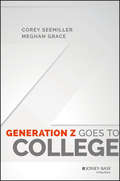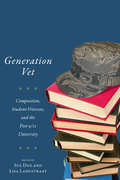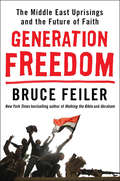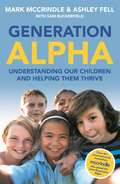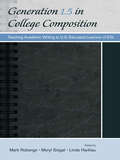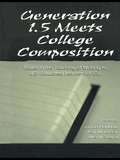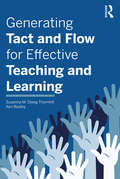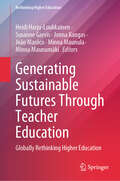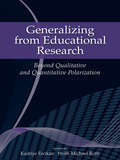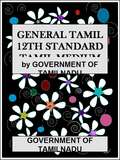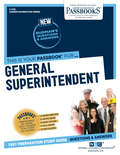- Table View
- List View
Generative AI and Education: Digital Pedagogies, Teaching Innovation and Learning Design (SpringerBriefs in Education)
by B. Mairéad PratschkeThis volume addresses the gap in knowledge around generative AI and its applications in education. It draws on the recent history of technological innovation and digital pedagogies, locating generative AI in the contemporary discourse around education futures. It argues that a new hybrid model of education is emerging, requiring educational institutions to embed generative AI into course and programme design, delivery and assessment. It also proposes a shift from a focus on learning as output to learning as a process, and explores what that shift might look like. Grounded in educational theory, it offers actionable pedagogy-informed guidance on how to position AI as a collaborator in the construction of learning in a manner that is congruent with the values and aims of education. It offers advice based on evidence-based digital pedagogy, including frameworks for effective teaching and learning with generative AI, that enable educators and designers to put these ideas into practice. The book also explores the wider context informing this shift, connecting narratives from governments and industry leaders on the strategic importance of generative AI and lifelong learning, learning agility, and future skills that make the case for the integration of competency-based assessment into mainstream education. Finally, going beyond pedagogy and practice, it considers of some of the broader issues, including limitations and ethics, and the implications of integrating generative AI into institutional planning and design, and includes a sample roadmap for education leaders to start the process of integrating generative AI into their institutions. This work approaches the topic of generative AI from the vantage point of educators by addressing themes and concerns that will resonate with professionals in the sector.
Generations of Women Historians: Within and Beyond the Academy
by Melinda S. Zook Hilda L. SmithThis collection focuses on generations of early women historians, seeking to identify the intellectual milieu and professional realities that framed their lives. It moves beyond treating them as simply individuals and looks to the social and intellectual forces that encouraged them to study history and, at the same time, would often limit the reach and define the nature of their study. This collection of essays speaks to female practitioners of history over the past four centuries that published original histories, some within a university setting and some outside. By analysing the values these early women scholars faced, readers can understand the broader social values that led women historians to exist as a unit apart from the career path of their male colleagues.
Generations in the World of Work
by Corey Seemiller Meghan GraceGenerations in the World of Work provides invaluable data-informed insights into the intergenerational dynamics in today’s workplaces.Generational experts and authors of Generation Z: A Century in the Making, Corey Seemiller and Meghan Grace present the perceptions, motivations, and preferences of various generational cohorts and share how those shape individual behaviors, communication and collaboration, as well as wider organizational structures and norms. They offer guidance for how to maximize productivity and relationships to navigate dynamics across generational cohorts.Generations in the World of Work offers employees, managers, and organizational leaders guidance for maximizing productivity, relationships, wellbeing, and engagement across generational differences in order to create thriving workplaces that value and leverage each person’s strengths.
Generations at School: Building an Age-Friendly Learning Community
by Suzette Lovely Austin G. BuffumHelps school leaders cultivate improvement-driven, cross-age learning communities by providing case studies, workplace alternatives, and easy-to-apply strategies to promote cross-generational collaboration.
Generational Identity, Educational Change, and School Leadership (Routledge Research in Educational Leadership #7)
by Corrie Stone-JohnsonGenerational identity plays a large role in how teachers view educational change and school reform. Teachers of the Boomer generation, an era characterized by optimism and innovation, tend to be more resistant to change than those of Generation X, for whom standardization represents the norm, not a shift. This volume reviews five decades of research on educational change and teachers’ varying responses to it from a generational perspective, providing school leaders with insight on how best to relate to these groups to achieve a common goal. Through ongoing professional development oriented by multigenerational grouping, teachers and school leaders can define success and create a multigenerational understanding of what good teaching and leadership look like.
Generation on a Tightrope
by Arthur Levine Diane R. DeanAn understanding of today's undergraduate college students is vital to the effectiveness of our nation's colleges and universities. As Generation on a Tightrope clearly reveals, today's students need a very different education than the undergraduates who came before them: an education for the 21st Century, which colleges and universities are so far ill-equipped to offer and which will require major changes of them to provide. Examining college student expectations, aspirations, academics, attitudes, values, beliefs, social life, and politics, this book paints an accurate portrait of today's students. Timely and comprehensive, this volume offers educators, researchers, practitioners, policymakers, and employers guidance and a much-needed grasp of the forces shaping the experiences of current undergraduates. The book: Is based on completely new research of 5,000 college students and student affairs practitioners from 270 diverse college campuses Explores the similarities and differences between today's generation of students and previous generations
Generation at the Crossroads: Apathy and Action on the American Campus
by Paul Rogat LoebTells the stories of college students in the late 80's and early 90's who chose to become politically active on campus as well as students who chose not to.
Generation Z Goes to College
by Corey Seemiller Meghan GraceSay Hello to Your Incoming Class--They're Not Millennials Anymore Generation Z is rapidly replacing Millennials on college campuses. Those born from 1995 through 2010 have different motivations, learning styles, characteristics, skill sets, and social concerns than previous generations. Unlike Millennials, Generation Z students grew up in a recession and are under no illusions about their prospects for employment after college. While skeptical about the cost and value of higher education, they are also entrepreneurial, innovative, and independent learners concerned with effecting social change. Understanding Generation Z's mindset and goals is paramount to supporting, developing, and educating them through higher education. Generation Z Goes to College showcases findings from an in-depth study of over 1,100 Generation Z college students from 15 vastly different U.S. higher education institutions as well as additional studies from youth, market, and education research related to this generation. Authors Corey Seemiller and Meghan Grace provide interpretations, implications, and recommendations for program, process, and curriculum changes that will maximize the educational impact on Generation Z students. Generation Z Goes to College is the first book on how this up-and-coming generation will change higher education.
Generation Z
by Victoria Carrington Jennifer Rowsell Esther Priyadharshini Rebecca WestrupThis book argues that the mythic figure of the zombie, so prevalent and powerful in contemporary culture, provides the opportunity to explore certain social models - such as 'childhood' and 'school', 'class' and 'family' - that so deeply underpin educational policy and practice as to be rendered invisible. It brings together authors from a range of disciplines to use contemporary zombie typologies - slave, undead, contagion - to examine the responsiveness of everyday practices of schooling such as literacy, curriculum and pedagogy to the new contexts in which children and young people develop their identities, attitudes to learning, and engage with the many publics that make up their everyday worlds.
Generation Vet: Composition, Student Veterans, and the Post-9/11 University
by Sue Doe and Lisa LangstraatInstitutions of higher education are experiencing the largest influx of enrolled veterans since World War II, and these student veterans are transforming post-secondary classroom dynamics. While many campus divisions like admissions and student services are actively moving to accommodate the rise in this demographic, little research about this population and their educational needs is available, and academic departments have been slower to adjust. In Generation Vet, fifteen chapters offer well-researched, pedagogically savvy recommendations for curricular and programmatic responses to student veterans for English and writing studies departments. In work with veterans in writing-intensive courses and community contexts, questions of citizenship, disability, activism, community-campus relationships, and retention come to the fore. Moreover, writing-intensive courses can be sites of significant cultural exchanges—even clashes—as veterans bring military values, rhetorical traditions, and communication styles that may challenge the values, beliefs, and assumptions of traditional college students and faculty. This classroom-oriented text addresses a wide range of issues concerning veterans, pedagogy, rhetoric, and writing program administration. Written by diverse scholar-teachers and written in diverse genres, the essays in this collection promise to enhance our understanding of student veterans, composition pedagogy and administration, and the post-9/11 university.
Generation Freedom
by Bruce FeilerTimely and provocative, Generation Freedom looks at the historic youth uprisings sweeping the Middle East and what they mean for the future of peace, coexistence, and relations with the West.At a time when the world is asking how the Arab Spring and the death of Osama bin Laden will reshape our times, Bruce Feiler, bestselling author of Walking the Bible and Abraham, offers a vivid behind-the-scenes portrait of history in the making. He marches with the daring young organizers in Liberation Square, confronts the head of the Muslim Brotherhood, and witnesses the dramatic rebuilding of a church at exactly the moment sectarian violence threatens the peaceful movement. Drawing on fifteen years of travels across the region, from Egypt to Israel, Iraq to Iran, Feiler brings his unprecedented experience to the most pressing questions: how the rise of freedom will affect terrorism; Middle East peace; and relations among Jews, Christians, and Muslims worldwide. Eloquent and thoughtful, Generation Freedom offers a hopeful vision of how this unrivaled upheaval will transform the world.
Generation Alpha
by Mark McCrindleEverything you need to know about how to best raise, educate and guide Generation Alpha (born 2010-24) - the most materially endowed and technologically literate generation ever - to help them live their best life.Renowned social demographer Mark McCrindle shares everything we need to know about Generation Alpha in this accessible, fascinating book for parents and educators on how the most globally connected generation ever (born 2010-2024) will grow up, how we should parent them, what we should teach them and what we need to be aware of to ensure that we get the best out of them.Discussing the impacts of the recent Coronavirus pandemic as an educational, world health and economic crisis with a unique set of problems presented to this first-ever remote-learning generation, Mark will help parents understand how complex the life experiences of today's children truly are. From looking at digital anxieties around social media to the unprecedented rise of environmental and social consciousness at a young age, Mark McCrindle will help parents and teachers to create the best possible framework for a child's development right the way through into adulthood.
Generation 1.5 in College Composition: Teaching Academic Writing to U.S.-Educated Learners of ESL
by Mark Roberge Linda Harklau Meryl Siegal'… A well-organized volume with a strong emphasis on pedagogy.' – Trudy Smoke, Hunter College/City University of New York, USA 'Generation 1.5 is the most interesting topic of concern in ESL today, yet publications are few and far between.... The editors clearly know what they’re doing…. They know the field, know the subject matter, and understand the problems…. This volume contributes to the thinking in the field.' – Linda Lonon Blanton, University of New Orleans, USA Building on the work that has been done over the past decade, this volume provides theoretical frameworks for understanding debates about immigrant students, studies of students’ schooling paths and language and literacy experiences, and pedagogical approaches for working with Generation 1.5 students. Generation 1.5 in College Composition: is designed to help both scholars and practitioners reconceptualize the fields of College Composition and TESOL and create a space for research, theory, and pedagogy focusing on postsecondary immigrant ESL students provides both important new theoretical work (which lays the underpinnings for serious pedagogical innovation) and important new pedagogical approaches. Because of their varied and complex language and literacy profiles, Generation 1.5 students are found in developmental English courses, college ESL courses, and mainstream college writing courses. This volume is directed to preservice and inservice teachers, teacher educators, and researchers involved with educating Generation 1.5 students in these and other contexts.
Generation 1.5 Meets College Composition: Issues in the Teaching of Writing To U.S.-Educated Learners of ESL
by Kay M. Losey Linda Harklau Meryl SiegalAn increasing number of students graduate from U.S. high schools and enter college while still in the process of learning English. This group--the "1.5 generation"--consisting of immigrants and U.S. residents born abroad as well as indigenous language minority groups, is rapidly becoming a major constituency in college writing programs. These students defy the existing categories in most college writing programs, and in the research literature. Experienced in American culture and schooling, they have characteristics and needs distinct from the international students who have been the subject of most research and literature on ESL writing. Furthermore, in studies of mainstream college composition, basic writing, and diversity, these students' status as second-language learners is usually left unaddressed or even misconstrued as underpreparation. Nevertheless, research and pedagogical writings have yet to take up the particular issues entailed in teaching composition to this student population. The intent in this volume is to bridge this gap and to initiate a dialogue on the linguistic, cultural, and ethical issues that attend teaching college writing to U.S.-educated linguistically diverse students. This book is the first to address explicitly issues in the instruction of "1.5 generation" college writers. From urban New York City to midwestern land grant universities to the Pacific Rim, experienced educators and researchers discuss a variety of contexts, populations, programs, and perspectives. The 12 chapters in this collection, authored by prominent authorities in non-native language writing, are research based and conceptual, providing a research-based survey of who the students are, their backgrounds and needs, and how they are placed and instructed in a variety of settings. The authors frame issues, raise questions, and provide portraits of language minority students and the classrooms and programs that serve them. Together, the pieces paint the landscape of college writing instruction for 1.5 generation students and explore the issues faced by ESL and college writing programs in providing appropriate writing instruction to second-language learners arriving from U.S. high schools. This book serves not only to articulate an issue and set an agenda for further research and discussion, but also to suggest paths toward linguistic and cultural sensitivity in any writing classroom. It is thought-provoking reading for college administrators, writing teachers, and scholars and students of first- and second-language composition.
Generating Tact and Flow for Effective Teaching and Learning
by Ken Badley Susanna M. ThornhillThis book draws from and analyzes teachers’ and students’ stories of great classes in order to promote teachers’ development of pedagogical tact and to encourage flow states for students. Taken together, these theoretical lenses—pedagogical tact and flow—provide a valuable framework for understanding and motivating classroom engagement. As the authors suggest, tactful teachers are more likely to see their students in flow than teachers who struggle with basic classroom routines and practices. Grounded in narrative research, and written for pre-service teachers, the book offers strategies for replicating these first-hand accounts of peak classroom teaching and learning.
Generating Sustainable Futures Through Teacher Education: Globally Rethinking Higher Education (Rethinking Higher Education)
by Susanne Garvis Heidi Harju-Luukkainen Jonna Kangas João Marôco Minna Maunula Minna MaunumäkiThis book examines policies and practices within higher education, particularly in the field of teacher education, that foster sustainability from a variety of viewpoints. It sheds light on both common facilitators and obstacles across 18 research-oriented chapters. It scrutinizes global research, policies, and practices, and delves into the theoretical frameworks and empirical evidence that underpin the research. It also offers critical perspectives on teacher education, emphasizing potential areas for growth. The collective findings presented in this book offer valuable insights into the sustainable development of teaching and research within higher education institutions, providing readers with a deeper understanding of the challenges at hand. Its concluding chapter culminates in an action plan for higher education institutions, synthesizing the global research presented throughout; with the aim of rejuvenating higher education and, consequently, societies as a whole. In essence, this book serves as a catalyst for initiating a global conversation within higher education, facilitating the exploration of new discourse topics, and transforming the mindset prevalent in academia, all with the ultimate goal of nurturing sustainable futures.
Generalizing from Educational Research: Beyond Qualitative and Quantitative Polarization
by Kadriye Ercikan Wolff-Michael Roth"This book frames the major challenge facing educational researchers as one of going beyond the mindless qualitative-quantitative divide and addressing the overarching/fundamental challenge of enriching and enlarging educational inquiry. It is a signature contribution to the field." - Clifton F. Conrad, University of Wisconsin-Madison, USA Tackling one of the most critical issues in education research today - how research methods are related to value and meaningfulness - this frontline volume achieves two purposes. First, it presents an integrated approach to educational inquiry that works toward a continuum instead of a dichotomy of generalizability, and looks at how this continuum might be related to types of research questions asked and how these questions should determine modes of inquiry. Second, it discusses and demonstrates the contributions of different data types and modes of research to generalizability of research findings, and to limitations of research findings that utilize a single approach. International leaders in the field take the discussion of generalizing in education research to a level where claims are supported using multiple types of evidence. The volume pushes the field in a different direction, where the focus is on creating meaningful research findings that are not polarized by qualitative versus quantitative methodologies. The integrative approach allows readers to better understand possibilities and shortcomings of different types of research.
General Tamil class 12 - Tamil Nadu Board
by Government TamilnaduEducation is not only the way to become wise but it is the foundation of life forever. We have understood that the textbooks in students hands create a way to succeed as well as lead others to follow up with new inventions. The methods and technics used in this book will definitely make the students to feel free and comfortable even while learning tough concepts.
General Tamil class 11 - Tamil Nadu Board - SCERT: பொது தமிழ் வகுப்பு 11 - தமிழ்நாடு வாரியம் - எஸ்.சி.இ.ஆர்.டி.
by Government TamilnaduEducation is not only the way to become wise but it is the foundation of life forever. We have understood that the textbooks in students hands create a way to succeed as well as lead others to follow up with new inventions. The methods and technics used in this book will definitely make the students to feel free and comfortable even while learning tough concepts.
General Tamil class 10 - Tamil Nadu Board - SCERT: தமிழ் பத்தாம் வகுப்பு
by Accessible E-Book production Unit KVFஇந்த 10ஆம் வகுப்பு பாடப்புத்தகத்தில் பலவிதமான கவிதைகளும், மேதைகளைப் பற்றியும் நாம் தெரிந்து கொள்ள முடிகிறது. இதை பயன் உள்ள வகையில் நாம் பயன்படுத்தி கொள்ள முடியும்.
General Supervisor: Passbooks Study Guide (Career Examination Series #C-1295)
by National Learning CorporationThe General Supervisor Passbook® prepares you for your test by allowing you to take practice exams in the subjects you need to study. It provides hundreds of questions and answers in the areas that will likely be covered on your upcoming exam, including but not limited to: administration; administrative supervision; program planning and evaluation; understanding and interpreting written material; preparing written material; and other related areas.
General Superintendent: Passbooks Study Guide (Career Examination Series #C-2097)
by National Learning CorporationThe General Superintendent Passbook® prepares you for your test by allowing you to take practice exams in the subjects you need to study. It provides hundreds of questions and answers in the areas that will likely be covered on your upcoming exam, including but not limited to: methods, materials, tools, terminology, and equipment used in street and road construction and maintenance; interpretation of plans and specifications; administrative supervision; construction and maintenance of municipal piping systems; street cleaning and maintenance including scraping, flushing, snow removal, salting and sanding; maintenance related to various public works functions; and more.
General Studies Solved Paper II Competitive Exam
by Indic TrustThis is a compilation of questions answer of Civil Service Examination 2017 General Studies Papers II.
General Studies Indian Economy I and II - competitive exam
by Sriram IasThe best book on Indian Economy By SRIRAM IAS, recommended by civil service exam experts. The book includes the previous year question and point by point description and analysis.
General Studies Environment and Ecology - Competitive Exam
by Indic TrustThis is a compilation of questions answer of General Studies Environment and Ecology For Civil Services Competitive Examinations.
